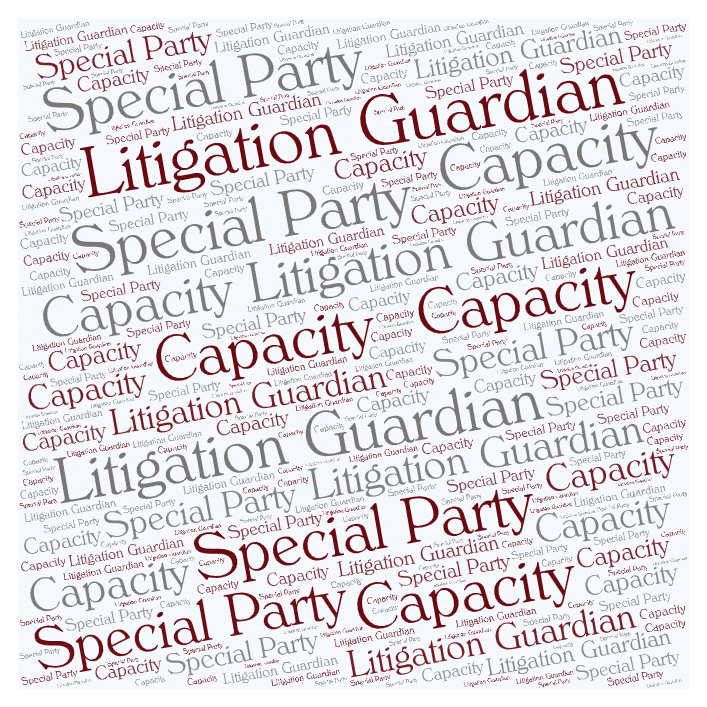The recent decision in the case of Chai v. Law 2020 ONSC 6998 provides a useful summary of the procedural steps and evidence required for someone to be appointed as the litigation guardian for a party involved in a family law claim.
Mr. Chai and Ms. Law were a married couple who were divorced in 2018 without equalizing their net family property. In 2018, Mr. Chai commenced an Application for equalization. The decision in this matter is regarding a motion to have Mr. Chai declared as a “special party” under Rule 2 of the Family Law Rules and to have the parties’ daughter, Peggy Chai, appointed as his litigation guardian. Mr. Chai had appointed Peggy as his Attorney for Property and Personal Care in 2017.
Procedural Issue
The motion to have Mr. Chai declared as a “special party” was ostensibly brought by Mr. Chai, however the instructions to counsel on the motion were provided by his daughter, Peggy Chai. The court found that while there does not appear to be a prohibition against a party arguing that they are a “special party”, it held that in this case the motion should have been brought by Peggy, as the party seeking to have Mr. Chai declared a “special party” and as the person seeking to be appointed Mr. Chai’s litigation guardian.
Notwithstanding that the motion should have been brought by Peggy, the court did not find it necessary to dismiss the motion as a result. The court did not find that there was any prejudice to the Respondent and that if leave were necessary to amend the Notice of Motion, the judge would have granted it.
Declaration of “Special Party”
Under Rule 2(1) of the Family Law Rules a “special party” is one “who is or appears to be mentally incapable for the purposes of the Substitutes Decisions Act, 1992 in respect of an issue in the case and who, as a result requires legal representation.”
In analyzing the concept of capacity under the Substitutes Decision Act, the court stated that a person is a “special party” where the party is “not able to understand information relevant to making a decision regarding the issue, or is not able to appreciate the reasonably foreseeable consequences of a decision or lack of a decision about the issue.” In this case, where the issue was about property and division of property, Mr. Chai needed to have the ability to understand information about the financial circumstances of both he and Ms. Law and to be able to appreciate the consequences of his decisions.
The court set out the evidence that may be considered to determine whether a party should be declared a “special party”. This includes:
- Medical or psychological evidence regarding the litigant;
- Evidence from persons who know the litigant well;
- The appearance and demeanor of the litigant;
- The testimony of the litigant; and
- The opinion of the litigant’s own counsel.
The court accepted the evidence of Mr. Chai’s primary physician that Mr. Chai did not have capacity to make financial decisions. Mr. Chai’s doctor was not a trained capacity assessor and acknowledged as such but provided information about Mr. Chai’s medical issues, including dementia and his capacity to perform basic and daily tasks. In considering additional non-medical evidence and the fact that the opinion of Mr. Chai’s physician was uncontroverted, the threshold to declare Mr. Chai as a “special party” was met.
Appointment of Litigation Guardian
Rule 4(2) of the Family Law Rules provides that the court may authorize “a person to represent a special party or a child if the person is, (a) appropriate for the task; and (b) willing to act as representative.”
The court found that in this case, while tensions existed between Peggy and the Respondent, the actions taken by Peggy were not sufficient to find her to be an appropriate person to act as Litigation Guardian. Peggy was appointed as Mr. Chai’s Attorney for Property and Personal Care and this was not disputed. The court found that this was not an appropriate case to refer to the Public Guardian and Trustee, as a result.
This case also serves as a reminder of the importance of appointing an Attorney for Property and Personal Care. The fact that Peggy had been previously appointed as Attorney for Personal Care and Property likely gave some reassurance to the court that Mr. Chai trusted Peggy to make decisions on his behalf. An Attorney for Property may authorize the Attorney to act as litigation guardian. Given the tensions that existed between Peggy and the Respondent, there may have been a different result had Peggy not been appointed by Mr. Chai as his Attorney for Property and Personal Care.
This blog post was written by Kate Wright, a member of the Family Law, Wills and Estates and Estate Litigation teams. She can be reached at 613-369-0383 or at kate.wright@mannlawyers.com.








